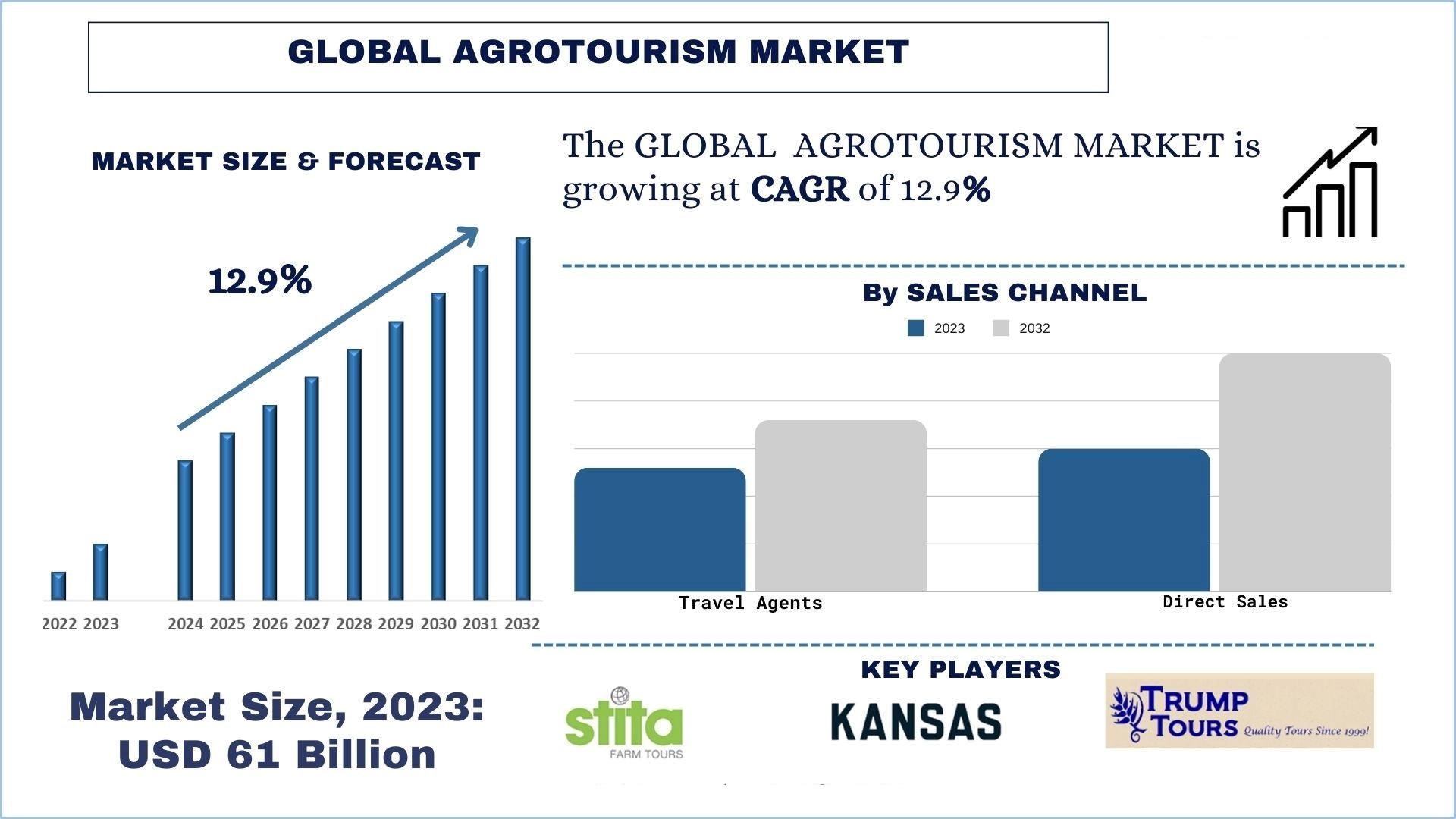In India, agritourism market is a growing industry that combines tourism and agriculture to give guests an immersive, one-of-a-kind experience of rural life. This developing sector has many chances for environmental education, cultural preservation, and economic growth. We explore the latest data, emerging patterns, and prospects for agritourism in India in this blog.
The Agritourism Landscape in India
India, with its rich agricultural heritage and diverse landscapes, is well-positioned to leverage agritourism. The concept involves tourists visiting working farms, ranches, or any agricultural operation for enjoyment, education, or active involvement in the activities of the farm. From farm stays to hands-on farming experiences, the sector offers a variety of attractions.
Recent Statistics and Market Trends
The Ministry of Tourism's 2023 annual report highlights the increasing interest in rural and agritourism. It notes that domestic tourism in rural areas is growing, supported by government initiatives like the Swadesh Darshan Scheme, which aims to develop theme-based tourist circuits that include rural and agritourism sites. The Indian government has launched several campaigns to promote agritourism, recognizing its potential to boost rural economies, provide additional income streams for farmers, and offer unique tourism experiences. Here are some recent initiatives:
- Swadesh Darshan Scheme: This scheme, launched by the Ministry of Tourism, aims to develop theme-based tourist circuits across India, including rural and agritourism circuits. It provides financial support to state governments to develop the necessary infrastructure to support these tourism circuits, thereby promoting agritourism as part of a broader strategy to enhance rural tourism.
- PRASHAD Scheme: The Pilgrimage Rejuvenation and Spiritual Augmentation Drive (PRASHAD) also supports the development of rural and agritourism by enhancing tourist infrastructure around spiritual and pilgrimage sites, many of which are located in rural areas. This indirectly boosts agritourism by attracting more visitors to rural regions.
- Kerala Agri Tourism Network: Initiated by the Kerala State Government, this network aims to boost farm tourism post-COVID-19 by providing training and support to farmers. It helps them create agritourism experiences that attract tourists, thereby supplementing their income and promoting sustainable tourism practices.
- Maharashtra Agritourism Policy: Maharashtra has been a pioneer in agritourism in India. The state government, with the help of the Agri Tourism Development Corporation (ATDC), has formulated policies to promote agritourism. One significant initiative mandates educational trips to farms for school students, helping inculcate an appreciation for agriculture from a young age. This policy aims to reach nearly one crore students across the state.
Key Drivers of Agritourism Growth
- Government Support and Policies: The Indian government has been proactive in promoting agritourism through various schemes and policies. The Kerala State Government's Kerala Agri Tourism Network and training programs to boost farm tourism post-COVID-19 are notable examples. Such initiatives provide the necessary infrastructure and support to farmers and rural communities, encouraging them to participate in the tourism sector.
- Growing Consumer Interest: There is a rising consumer interest in unique travel experiences that offer a break from conventional tourism. Farm stays, where visitors can engage in daily farm activities, have gained popularity. For instance, Airbnb reported a significant increase in searches for farm stays, highlighting a shift in traveler preferences towards more immersive and sustainable tourism experiences.
- Economic Diversification: Agritourism offers farmers an additional revenue stream, helping them diversify their income. This is particularly beneficial during off-seasons or periods of low agricultural yield. The agritourism sector supports rural economies by attracting tourists who spend on local goods and services, thereby boosting local businesses and employment.
- Cultural and Environmental Education: Agritourism plays a crucial role in educating visitors about sustainable farming practices, local culture, and the importance of environmental conservation. It provides an opportunity for urban dwellers to reconnect with nature and understand the origins of their food.
Opportunities in Agritourism
- Farm Stays and Rural Accommodations: Offering comfortable accommodations on farms allows tourists to experience rural life firsthand. These stays can be complemented with activities such as milking cows, harvesting crops, or cooking traditional meals.
- Farm-to-Table Dining: Agritourism can capitalize on the farm-to-table movement by offering fresh, locally-sourced meals. This not only provides a unique dining experience but also supports local farmers and reduces the carbon footprint associated with food transportation.
- Educational Tours and Workshops: Organizing educational tours and workshops can attract schools, families, and individuals interested in learning about agriculture. These activities can include farm tours, gardening workshops, and classes on sustainable farming techniques.
- Adventure and Recreational Activities: Incorporating adventure activities like hiking, horseback riding, and bird watching can attract a broader audience. These activities provide additional entertainment options for tourists and enhance their overall experience.
Request Free Sample Pages with Graphs and Figures Here https://univdatos.com/get-a-free-sample-form-php/?product_id=60115
Challenges and Regulatory Hurdles
Despite the promising potential, the agritourism sector in India faces several challenges, primarily related to regulatory hurdles. Zoning laws and agricultural regulations can be complex and vary by region, making it difficult for farmers to obtain necessary permits for tourism activities. Additionally, compliance with health and safety standards, such as those outlined in the Food Safety and Standards Authority of India (FSSAI) regulations, can be demanding and require significant investment.
Future Prospects
The future of agritourism in India looks promising, with continued government support and growing consumer interest. As the sector matures, we can expect more innovative offerings that cater to diverse tourist preferences. Emphasizing sustainability and community involvement will be key to ensuring the long-term success of agritourism.
Conclusion
Agritourism in India presents a unique opportunity to blend agriculture with tourism, offering economic, cultural, and environmental benefits. With the right support and strategic development, this sector can play a significant role in rural development and sustainable tourism. As travelers seek more authentic and meaningful experiences, agritourism stands ready to meet this demand and flourish in the coming years.
Contact Us:
UnivDatos Market Insights
Email - contact@univdatos.com
Contact Number - +1 9782263411
Website -www.univdatos.com



